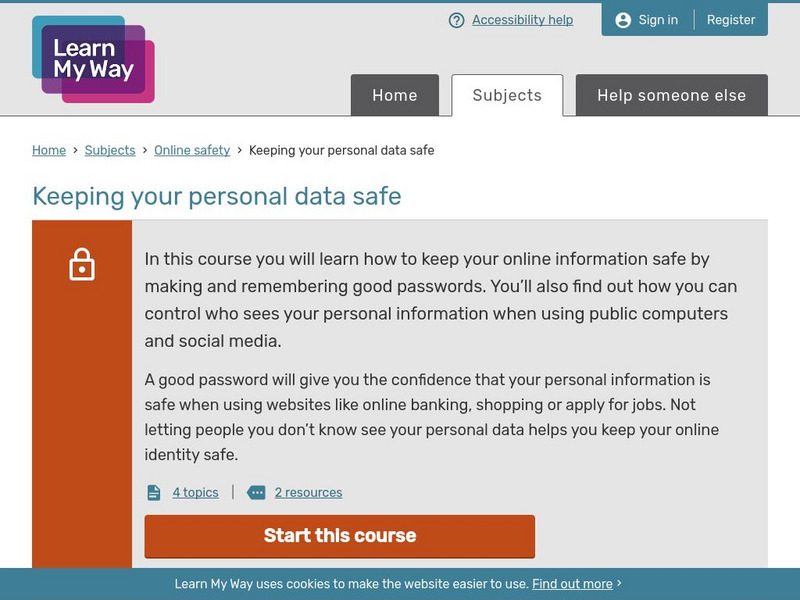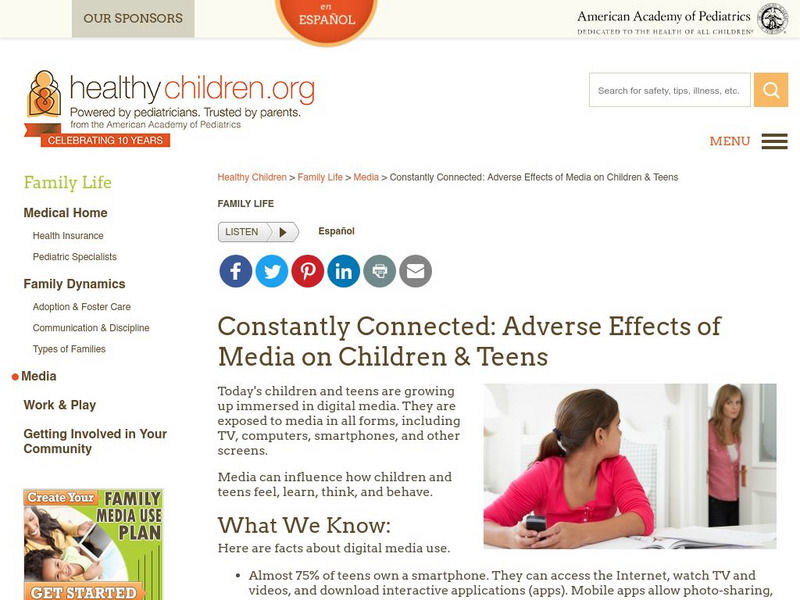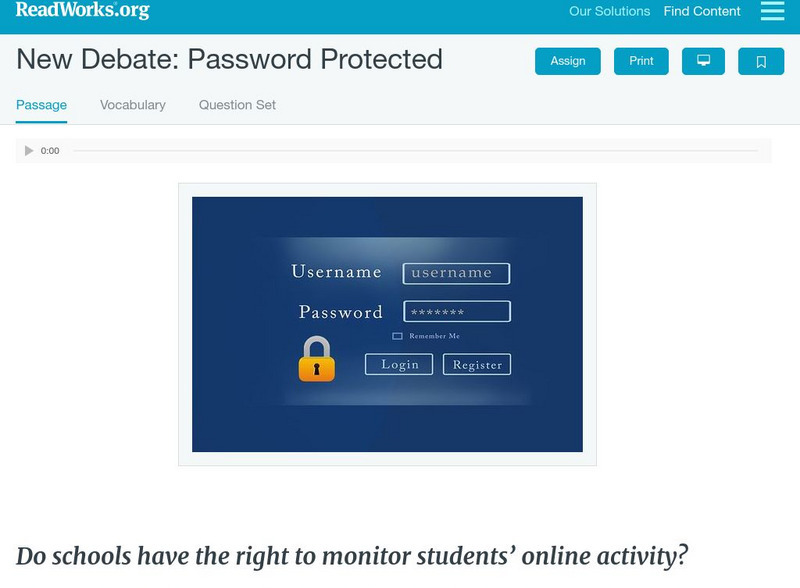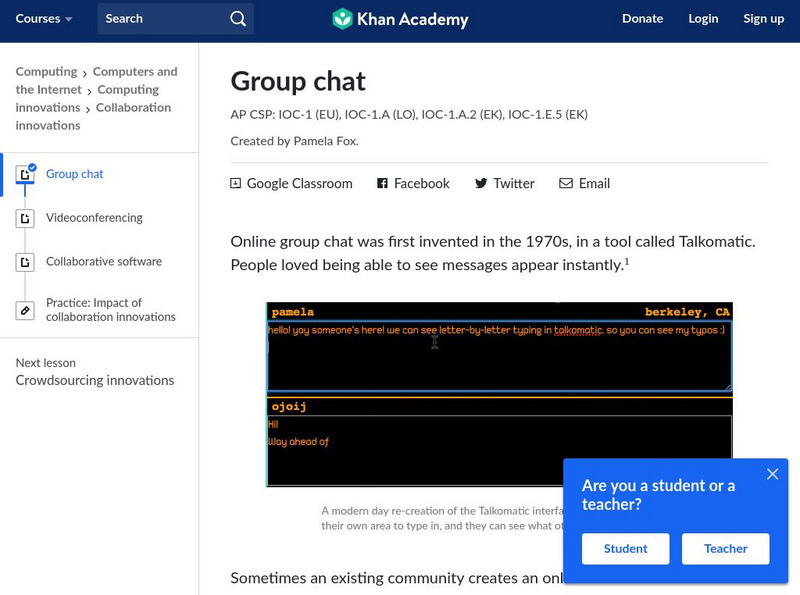Learn My Way
Learn My Way: Keeping Your Personal Data Safe
In this online course, students will learn how to keep their online information safe by making and remembering good passwords and also how to control who sees their personal information when using public computers and social media.
Other
Gov Loop: The 7 Barriers to Digital Communication
For all its conveniences, significant barriers to effective digital communication exist. These digital communication barriers can interfere with the ability to get a point across via email, chats, texts, messaging, discussion boards,...
Other
Gov Loop: Tips and Resources: Creating Accessible Digital Communication
With the massive shift to virtual work and education, it has become crucial that we strive to make all the content we put online accessible, particularly to people with disabilities who often experience barriers to accessing content....
Childnet
Childnet: Online Safety: For 11 14 Year Olds
This age group may spend lots of extra time online, and on their devices which is hard to manage. For those who are not yet 13 years old, they may feel extra pressure to join social media to stay in touch with friends. Use our activities...
Other
Copyrightlaws.com: 6 Best Practices for Legally Using Google Images
Google Images is an effective tool for locating the perfect image to use in presentations, documents and on social media. But before you use images found through Google, you must consider copyright law.
Louisiana Department of Education
Louisiana Doe: Curriculum Hub: Ela Guidebooks: Teenage Brain: Reflect on Composing Work
Reflect on how composing your work contributed to understanding the question "Should parents limit their teen's access to social media?"
Other
Aap: Constantly Connected: Adverse Effects of Media on Children & Teens
This article shares information about the adverse effects of the media on children's health.
CommonLit
Common Lit: "Anti Social Networks? We're Just as Cliquey Online" by Laura Sydell
A learning module that begins with "Anti-social Networks? We're Just as Cliquey Online" by Laura Sydell, accompanied by guided reading questions, assessment questions, and discussion questions. The text can be printed as a PDF or...
Common Sense Media
Common Sense Media: Education: Lesson: Feeling on Display
Are girls and guys judged differently when they post photos online? Students explore the pressures many teen girls and boys face to keep up appearances online. PDF (requires Adobe Reader).
Common Sense Media
Common Sense Media: Education: Who's Looking at Your Digital Footprint?
Our digital footprints can have a powerful impact on our future. This can be a scary thought, given that what's in our digital footprint isn't always in our control. Teach learners that digital footprints are an opportunity to showcase...
Other
Childnet International: Digizen: Social Networking
Most students participate in social networking applications such as Facebook, MySpace, or Twitter. This site presents the benefits and risks of using social networking tools in education. The site also presents examples of successful...
Louisiana Department of Education
Louisiana Doe: Curriculum Hub: Ela Guidebooks: Teenage Brain: Answer Questions About Ideas and Topics
We will answer questions about ideas and topics shared across texts to extend our understanding of complex texts and build our knowledge of social media's effect on the teen brain . This will help us gain a deeper understanding of the...
Other
Childnet International: Digizen: Social Networking Evaluation Chart
This checklist is designed to help review Social Networking Services. The information is from 2008 so parts may be outdated. The information is publicly available from service providers' websites (e.g., Terms of Use and Privacy Policy),...
Read Works
Read Works: News Debate Password Protected
[Free Registration/Login Required] An informational text debating whether or not schools have the right to monitor what students post online. A question sheet is available to help students build skills in reading comprehension.
Other
The Conversation: Face Time Can't Replace Face to Face Time in Social Distancing
A discussion about why digital communication can't replace face-to-face time.
Other
Click Z: Digital Marketing
This site offers current articles on issues related to online advertising.
CommonLit
Common Lit: "Online Identity" by Common Lit Staff
The Internet has heavily shaped our notion of identity. On the Internet, people can create a multitude of personas, some of which can be created with false information. As you read, take notes on the ways in which people express their...
Other
Brainspire: What Are the Effects of Technology on Human Interaction?
This article examines the positive and negative ways that technology impacts human interactions and relationships within families and with the wider world, as well as the implications the over-use of technology has on the growing child....
TED Talks
Ted: Ted Ed: Visualizing the World's Twitter Data
Good morning, Twitter! Millions of tweets are sent everyday, and from these tweets, we can gather a lot of information about people's lives: where they travel, when they wake up, and their opinions on pretty much everything. Jer Thorp...
Other
Wall Street Journal: The Secret Rally That Sparked an Uprising
Article describes the very beginning of the takeover of the Egyptian government by young activists. Although the outside world thought it was a spontaneous movement, this article describes the careful planning that went into the...
Texas Education Agency
Texas Gateway: Ap Macroeconomics: Introduction
This is an introduction to AP Macroeconomics; it includes an outline of what you will learn in Chapter 1. You will learn about the following: Economics and why it is important, microeconomics and macroeconomics, how economists use...
National Center for Missing & Exploited Children
Net Smartz Kids: The Boy Who Loved Im
Clicky tells the story of a boy who loves to IM his friends. What should he do when he receives a message from someone he doesn't know? [1:59]
Other
Cyberbullying Research Center
This site has links to other sites about cyberbullying. Cyberbullying is when E-mail, Instant Messaging (IM), Chatrooms, Bash Boards, Small Text-Messages (SMS), Web Sites, and Voting Booths are used to spread rumors, negative images,...






